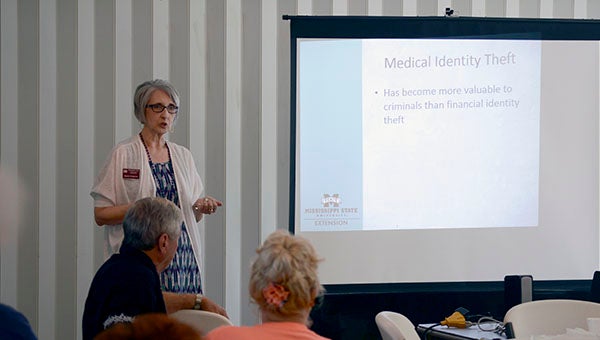Senior center learns about medical fraud
Published 7:00 am Tuesday, July 19, 2016

Susan Cosgrove, a representative from the Mississippi State University Extension Center, warned members of the Senior Center of South Pearl River County about the signs of medical identity theft and how to prevent it.
Photo by Julia Arenstam
Updated July 21 to add information about Senior Medicare Patrol of Mississippi.
Susan Cosgrove, an extension agent with the Mississippi State University Extension Center, presented the dangers of medical fraud to members of the Senior Center of South Pearl River County on Monday.
Every year, there is about $80 to $230 billion in medical fraud, said Cosgrove.
“It falls on the victim to fight medical fraud,” said Cosgrove.
Medical identity theft occurs when personal and medical information is stolen and used to obtain medical care, states a flyer Cosgrove presented to the audience.
Most often, medical identity theft comes from insider fraud, those seeing free medical treatment and those seeking addictive drugs, said Cosgrove.
She also said that 90 percent of medical providers have reported a breach of their records, both from inside and outside the company.
Cosgrove said some of the most common ways to detect medical fraud is if the person receives a billed for a medical service not rendered, is contacted by an unknown debt collector, receives medical collection notices for treatments not received or has an incorrect medical history.
Between 2014 and 2015, there was a 22 percent increase in the number of patients affected by medical identity theft, said Cosgrove.
Some easy ways to help prevent medical identity theft include confirming that charges listed on insurance explanation of benefits forms are correct by marking the dates of doctor or pharmacy visits on a calendar, being stingy with medical information, reviewing medical histories and confirming their accuracy and keeping a copy of all medical records, said Cosgrove.
Any suspicious records should be immediately reported to the police, patient’s insurance agency and medical providers, said Cosgrove.
She warned specifically against phishing emails that could appear to be from insurance companies, debt collectors or government agencies.
The Department of Health and Human Services handles Medicare fraud cases and can be reached at 1-800-447-8477 or at OIG.HHS.gov/faud/hotline.
Medicare has a call center and can be reached at 1-800-633-4227 or at medicare.gov.
The Federal Trade Commission has an Identity Theft Hotline at 1-877-438-4338 and online at FTC.gov/idtheft.
The Senior Medicare Patrol of Mississippi also works to help senior citizens prevent medical fraud. They can be reached at 1-877-272-8720 or at http://stopmedicarefraud.org/.




